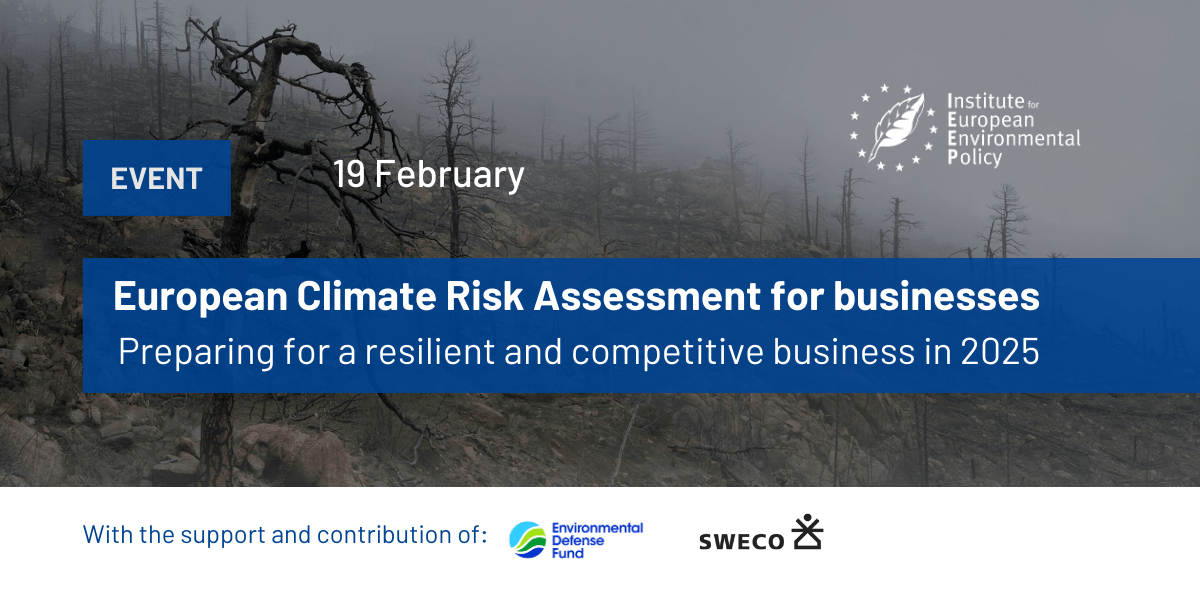Sowing the seeds of optimism for Europe’s biggest environmental challenges
This article is based on an interview between IEEP Executive Director, Céline Charveriat, and Debating Europe – a citizen’s forum for European issues. The interview can be viewed here.
What do you think are the biggest environmental challenges facing Europe today?
Overall, the ecological footprint of the average European is too large. If all citizens of the world adopted our lifestyle by 2050, we would need two planet Earths. This is why resource efficiency, a more circular economy and new lifestyles are critical. Europe needs to do more on climate change because we are using more than our fair share of the world’s carbon budget.
Our ecological footprints create two main impacts – pollution and environmental degradation. Pollution takes three main forms: air, water and chemical.
9 out of 10 city dwellers in Europe are exposed to air pollutants at concentrations that are deemed harmful to health. About half a million premature deaths were attributed to fine particulate matter in the air in 2011.
Increased use and mismanagement of pesticides and nitrates in agriculture contribute to degraded drinking water quality. We are producing over 300 million tonnes (mt) of plastic every year globally, and 5-15 mt of it are flowing into already polluted oceans. This negatively affects marine life, takes plastics out of our economy and impacts tourism, but it also could pose a human health risk through the ingestion of microplastics.
Rates of endocrine diseases and disorders correlate with the growth of the chemical industry, leading to concerns that these factors may be linked.
In Europe, 1 out of 4 men experience impaired fertility, which may correlate with the greater presence of chemical products in our everyday lives.
Two pressing forms of environmental degradation are soil degradation and biodiversity loss.
Approximately 22% of European land is affected by water and wind erosion. Around 45% of the mineral soils in Europe have low or very low organic carbon content because of unsustainable agriculture. The consequence of degraded soils is compromised agricultural systems that overall reduces food security. Despite all efforts, common bird farmland populations are still declining compared to the EU 2010 Biodiversity Baseline.
Will governments be able to cooperate to fix global issues such as climate change and biodiversity loss? Are you more optimistic?
Yes. I am much more optimistic than I was five years ago.
We are witnessing a massive increase in the efforts to fight climate change. Non-state actors are stepping up, which in turn puts pressure on governments to act. Look at the reactions from cities, business, civil society, and citizens in response to Trump’s decision to leave the Paris agreement. I’m optimistic about how emerging countries like China and India are taking bold action. China will open its new carbon trading scheme this year and is becoming a leader in green finance. What we need now is a similar change in the field of biodiversity and other planetary emergencies like the health of the oceans, where time is running out.
There are also seeds of optimism from actions being taken at other levels of society such as cities, local initiatives, and business.
The global alliance of cities – called the C40 – decided to go further than their governments. Action in urban areas could deliver 40% of the emissions cuts required to implement the Paris Accord. Many cities like Lyon are moving towards more sustainable transport systems, and cities like Oslo and Victoria-Gasteiz are improving access to nature for all. Cities are making climate commitments and there’s progress on green public procurement.
Investment in green infrastructure and access to nature is increasing in communities and neighbourhoods. Examples are the Alnarp Rehabilitation Garden in Sweden and the neighbourhood gardens in Vienna. There is growing demand by citizens for photovoltaics and organic and local product markets.
Businesses are exploring circular economy solutions, joining initiatives by organisations like the Ellen McArthur Foundation. Tech giants like Google and Facebook are increasing renewable energy usage, and companies like Unilever and Ikea are using the SDGs to guide their business strategy.
What is to blame for the decline of the bee population in Europe?
The list of threats to bee populations in Europe is unfortunately very long: land-use change, agriculture because of intensive agricultural practices and pesticide use, invasive alien species, diseases and climate change.
You have two types of bees: the commercial honeybees and the wild bees, and these threats affect them in different ways. Parasites, diseases, and pesticides make honeybees more fragile. Maintaining them alive and in good health is harder and harder for beekeepers. Wild be populations are put in jeopardy because land-use change and climate change. In many cases, the wild bees are probably doing more or most of the pollination work.
Is sustainable agriculture possible without pesticides?
It’s a really difficult debate.
The world population is set to rise to 10 billion people by 2050. It’s hard to conceive feeding this amount of people without technology to deal with plant diseases, weed competition and damage by insects.
But what is clearer is that our use of pesticides is unsustainable. It’s harming consumers, it’s harming animals and nature, and it’s harming farmers – who are the first victims of pesticide use. We need a profound change in the way we approach agriculture, and that’s why people are excited about the potential of more agro-ecological approaches to agriculture. Some solutions lie in the use green covers, crop rotation and natural ways of controlling pests and disease.Farmers are going to need advice and training to help transition to more sustainable practices. And we must do this while ensuring the protection of pollinators and soils.


